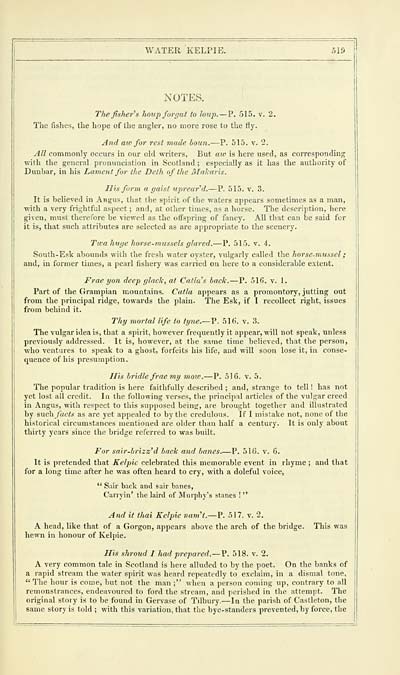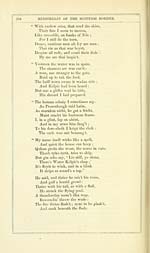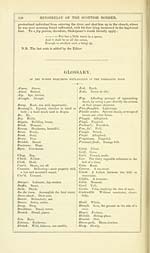Download files
Complete book:
Individual page:
Thumbnail gallery: Grid view | List view

WATER KELPIE.
NOTES.
The fisher's houp forgat to loup. — P. 515. v. 2.
The fishes, the hope of the angler, no more rose to the fly.
And aw for rest made houn.—V. 515. v. 2.
All commonly occurs in our old writers, But aw is here used, as corresponding
with the general pronunciation in Scotland ; especially as it has the authority of
Dunbar, in his Lament for the Deth of the Alakaris.
His form a garst uprear^d. — P. 515. v. 3.
It is beheved in Angus, that the spirit of the waters appears sometimes as a man,
with a very frightful aspect ; and, at other times, as a horse. The description, here
given, must therefore be viewed as the offspring of fancy. All that can be said for
it is, that such attributes are selected as are appropriate to the scenery.
Twa huge horse-mussels glared. — P. 515. v. 4.
South-Esk abounds with the fresh water oyster, vulgarly called the horse-mussel ;
and, in former times, a pearl fishery was carried on here to a considerable extent.
Frae yon deep glack, at Catla's back. — P. 516. v. 1.
Part of the Grampian mountains. Catla appears as a promontory, jutting out
from the principal ridge, towards the plain. The Esk, if I recollect right, issues
from behind it.
Thy mortal life to tyne.—V. 516". v. 3.
The vulgar idea is, that a spirit, however frequently it appear, will not speak, unless
previously addressed. It is, however, at the same time believed, that the person,
who ventures to speak to a ghost, forfeits his life, and will soon lose it, in conse-
quence of his presumption.
His bridle frae my moiv. — P. 516. v. 5.
The popular tradition is here faithfully described ; and, strange to tell ! has not
yet lost all credit. la the following verses, the principal articles of the vulgar creed
in Angus, with respect to this supposed beinsj, are brought together and illustrated
by &\}ic\\ facts as are yet appealed to by the credulous. If I mistake not, none of the
historical circumstances mentioned are older than half a century. It is only about
thirty years since the bridge referred to was built.
For sair-brizz'd back and banes — P. 516. v. 6.
It is pretended that Kelpie celebrated this memorable event in rhyme ; and that
for a long time after he was often heard to cry, with a doleful voice,
" Sair back and sair banes,
Carryin' the laird of Murphy's stanes ! "
And it thai Kelpie vam'i. — P. 517. v. 2.
A head, like that of a Gorgon, appears above the arch of the bridge. This was
hewn in honour of Kelpie.
His shroud I had prepared. — P. 518. v. 2.
A very common tale in Scotland is here alluded to by the poet. On the banks of
a rapid stream the water spirit was heard repeatedly to exclaim, in a dismal tone,
"The hour is come, but not the man ;" when a person coming up, contrary to all
remonstrances, endeavoured to ford the stream, and perished in the attempt. The
original story is to be found in Gervase of Tilbury. — In the parish of Castleton, the
same story is told ; with this variation, that the bye-standers prevented, by force, the
NOTES.
The fisher's houp forgat to loup. — P. 515. v. 2.
The fishes, the hope of the angler, no more rose to the fly.
And aw for rest made houn.—V. 515. v. 2.
All commonly occurs in our old writers, But aw is here used, as corresponding
with the general pronunciation in Scotland ; especially as it has the authority of
Dunbar, in his Lament for the Deth of the Alakaris.
His form a garst uprear^d. — P. 515. v. 3.
It is beheved in Angus, that the spirit of the waters appears sometimes as a man,
with a very frightful aspect ; and, at other times, as a horse. The description, here
given, must therefore be viewed as the offspring of fancy. All that can be said for
it is, that such attributes are selected as are appropriate to the scenery.
Twa huge horse-mussels glared. — P. 515. v. 4.
South-Esk abounds with the fresh water oyster, vulgarly called the horse-mussel ;
and, in former times, a pearl fishery was carried on here to a considerable extent.
Frae yon deep glack, at Catla's back. — P. 516. v. 1.
Part of the Grampian mountains. Catla appears as a promontory, jutting out
from the principal ridge, towards the plain. The Esk, if I recollect right, issues
from behind it.
Thy mortal life to tyne.—V. 516". v. 3.
The vulgar idea is, that a spirit, however frequently it appear, will not speak, unless
previously addressed. It is, however, at the same time believed, that the person,
who ventures to speak to a ghost, forfeits his life, and will soon lose it, in conse-
quence of his presumption.
His bridle frae my moiv. — P. 516. v. 5.
The popular tradition is here faithfully described ; and, strange to tell ! has not
yet lost all credit. la the following verses, the principal articles of the vulgar creed
in Angus, with respect to this supposed beinsj, are brought together and illustrated
by &\}ic\\ facts as are yet appealed to by the credulous. If I mistake not, none of the
historical circumstances mentioned are older than half a century. It is only about
thirty years since the bridge referred to was built.
For sair-brizz'd back and banes — P. 516. v. 6.
It is pretended that Kelpie celebrated this memorable event in rhyme ; and that
for a long time after he was often heard to cry, with a doleful voice,
" Sair back and sair banes,
Carryin' the laird of Murphy's stanes ! "
And it thai Kelpie vam'i. — P. 517. v. 2.
A head, like that of a Gorgon, appears above the arch of the bridge. This was
hewn in honour of Kelpie.
His shroud I had prepared. — P. 518. v. 2.
A very common tale in Scotland is here alluded to by the poet. On the banks of
a rapid stream the water spirit was heard repeatedly to exclaim, in a dismal tone,
"The hour is come, but not the man ;" when a person coming up, contrary to all
remonstrances, endeavoured to ford the stream, and perished in the attempt. The
original story is to be found in Gervase of Tilbury. — In the parish of Castleton, the
same story is told ; with this variation, that the bye-standers prevented, by force, the
Set display mode to: Large image | Transcription
Images and transcriptions on this page, including medium image downloads, may be used under the Creative Commons Attribution 4.0 International Licence unless otherwise stated. ![]()
| Early Gaelic Book Collections > J. F. Campbell Collection > Minstrelsy of the Scottish border > (613) |
|---|
| Permanent URL | https://digital.nls.uk/80607781 |
|---|
| Description | Volumes from a collection of 610 books rich in Highland folklore, Ossianic literature and other Celtic subjects. Many of the books annotated by John Francis Campbell of Islay, who assembled the collection. |
|---|
| Description | Selected items from five 'Special and Named Printed Collections'. Includes books in Gaelic and other Celtic languages, works about the Gaels, their languages, literature, culture and history. |
|---|

